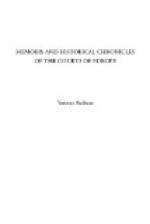But Fortune, envious of my hitherto prosperous journey, gave me two omens of the sinister events of my return.
The first was the sudden illness which attacked Mademoiselle de Tournon, the daughter of the lady of my bedchamber, a young person, accomplished, with every grace and virtue, and for whom I had the most perfect regard. No sooner had the boat left the shore than this young lady was seized with an alarming disorder, which, from the great pain attending it, caused her to scream in the most doleful manner. The physicians attributed the cause to spasms of the heart, which, notwithstanding the utmost exertions of their skill, carried her off a few days after my arrival at Liege. As the history of this young lady is remarkable, I shall relate it in my next letter.
The other omen was what happened to us at Huy, immediately upon our arrival there. This town is built on the declivity of a mountain, at the foot of which runs the river Meuse. As we were about to land, there fell a torrent of rain, which, coming down the steep sides of the mountain, swelled the river instantly to such a degree that we had only time to leap out of the boat and run to the top, the flood reaching the very highest street, next to where I was to lodge. There we were forced to put up with such accommodation as could be procured in the house, as it was impossible to remove the smallest article of our baggage from the boats, or even to stir out of the house we were in, the whole city being under water. However, the town was as suddenly relieved from this calamity as it had been afflicted with it, for, on the next morning, the whole inundation had ceased, the waters having run off, and the river being confined within its usual channel.
Leaving Huy, M. and Madame d’Aurec returned to Don John at Namur, and I proceeded, in the boat, to sleep that night at Liege.
LETTER XV
The Bishop of Liege, who is the sovereign of the city and province, received me with all the cordiality and respect that could be expected from a personage of his dignity and great accomplishments. He was, indeed, a nobleman endowed with singular prudence and virtue, agreeable in his person and conversation, gracious and magnificent in his carriage and behaviour, to which I may add that he spoke the French language perfectly.
He was constantly attended by his chapter, with several of his canons, who are all sons of dukes, counts, or great German lords. The bishopric is itself a sovereign State, which brings in a considerable revenue, and includes a number of fine cities. The bishop is chosen from amongst the canons, who must be of noble descent, and resident one year. The city is larger than Lyons, and much resembles it, having the Meuse running through it. The houses in which the canons reside have the appearance of noble palaces. The streets of the city are regular and spacious, the houses of the citizens well built, the squares large, and ornamented with curious fountains. The churches appear as if raised entirely of marble, of which there are considerable quarries in the neighbourhood; they are all of them ornamented with beautiful clocks, and exhibit a variety of moving figures.




